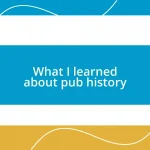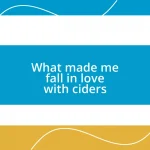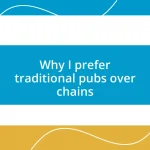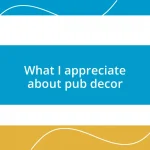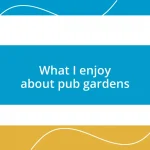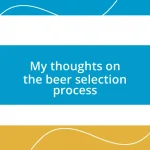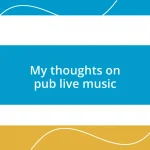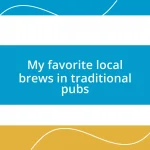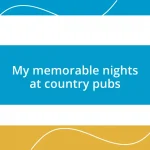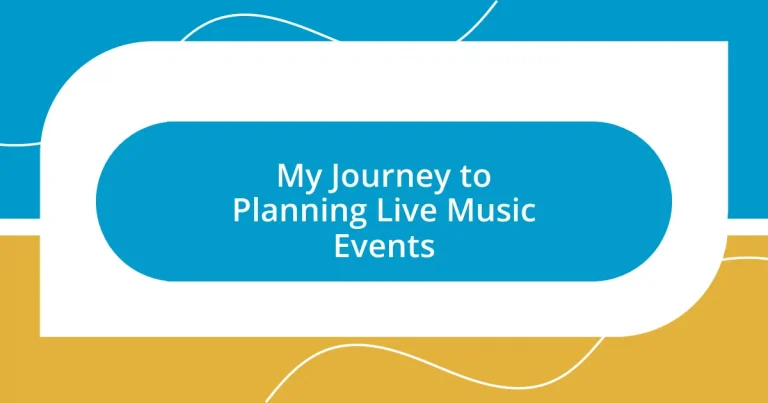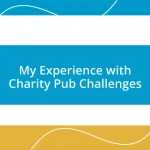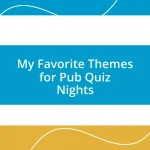Key takeaways:
- Live music creates transformative shared experiences, fostering community and emotional connections among attendees.
- The event planning process involves defining objectives, setting budgets, and building a passionate team to turn a vision into reality.
- Effective marketing and post-event feedback are crucial for enhancing future events and ensuring memorable moments for audiences.
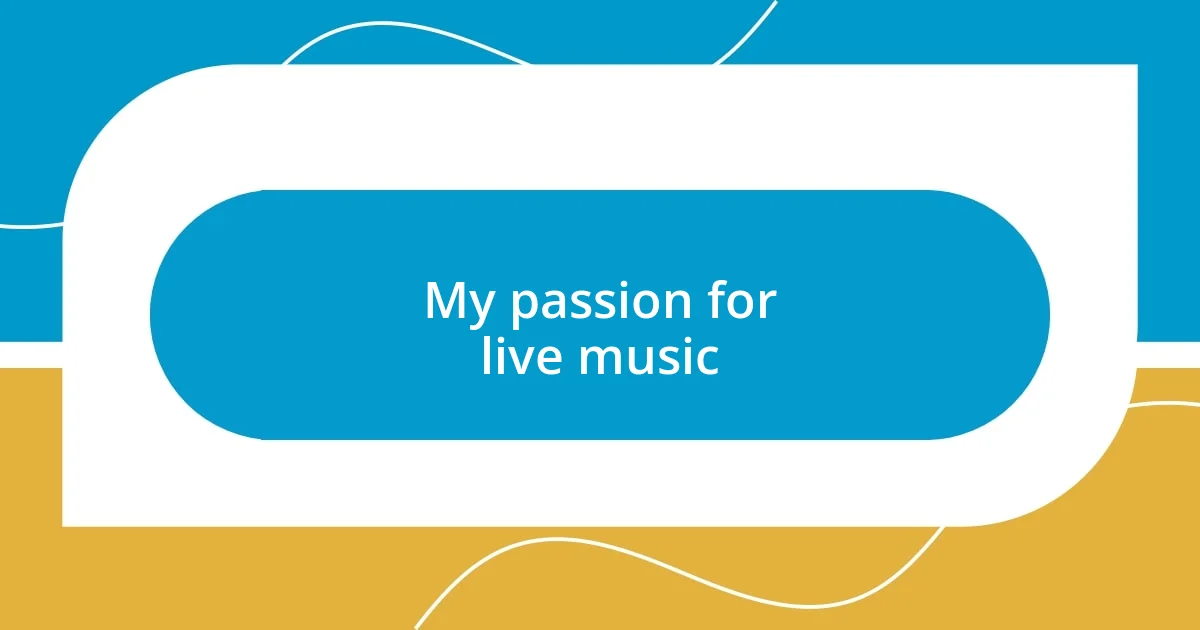
My passion for live music
Music has always been a soundtrack to my life, and I clearly remember the first concert I attended as a teenager. Surrounded by a sea of eager fans, the energy was palpable; every beat ignited a spark within me. That electrifying atmosphere made me realize how transformative live music can be, creating connections that simply can’t be replicated through headphones or speakers.
As I grew older, I found myself not just enjoying performances but analyzing every element that contributed to the experience. What is it about a live show that captivates us? Is it the thrill of sharing a moment with strangers who share the same passion? For me, watching an artist pour their heart and soul into a performance is an emotional roller coaster that reminds me of our shared humanity.
I recall one particular night when a local band played in a cozy venue, and their raw, unfiltered passion resonated so deeply that I felt it in my bones. Seeing the crowd sway and sing along created a sense of community that I cherish. It’s moments like these that fuel my passion for live music, driving me to ensure others experience that same magic.
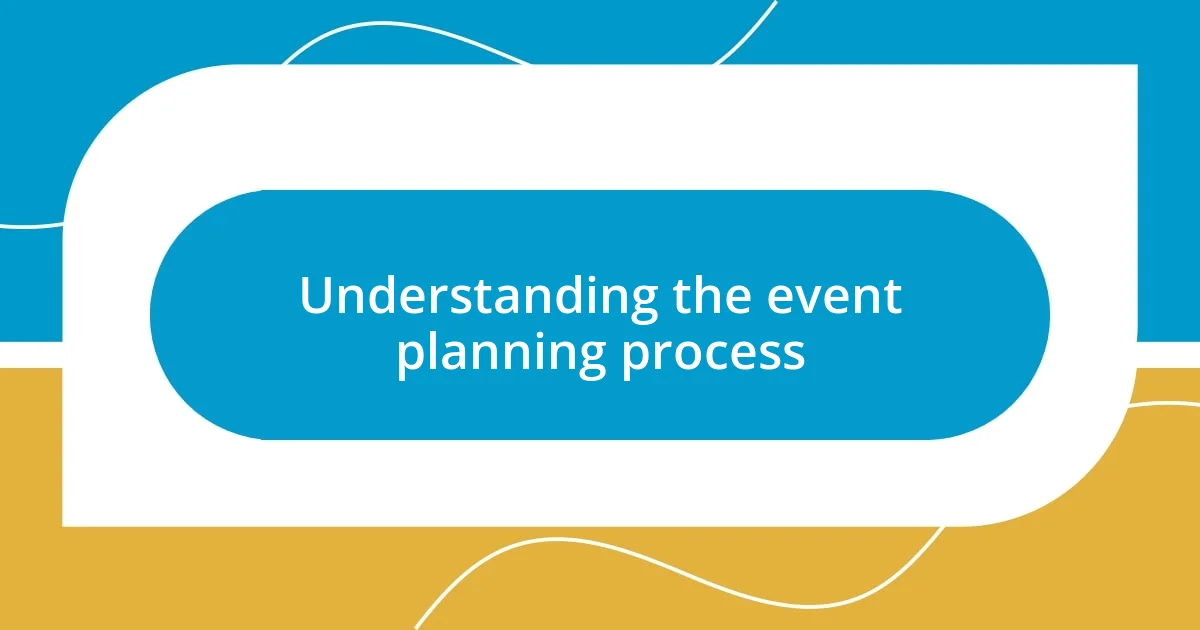
Understanding the event planning process
Understanding the event planning process involves breaking down the seamless flow that transforms an idea into a memorable experience. For me, it starts with a vision, often sparked by a personal connection to a song or an artist. Before I dive into details, I prefer to create a mood board or a concept outline, capturing my vision visually. This helps to align everyone involved and serves as a creative springboard.
Here’s a streamlined breakdown of the initial steps I usually take:
– Define Your Objective: What do you hope to achieve? Is it community engagement or fundraising?
– Set a Budget: This is crucial, as it dictates many future choices from venue to talent.
– Select a Date and Venue: I love scouting unique locations that can enhance the event’s vibe.
– Build Your Team: Surrounding myself with passionate individuals makes all the difference.
Once these foundations are laid, I can feel the excitement build, almost like the anticipation before the first chord of a favorite song strikes. I remember organizing a small festival; as I gathered a team whose enthusiasm mirrored my own, our collective passion transformed dreams into tangible plans. That camaraderie made every late-night discussion about logistics and artist preferences incredibly rewarding. Each step I took, powered by my love for music, shaped not just the event but also my understanding of what it means to create genuine moments for others.
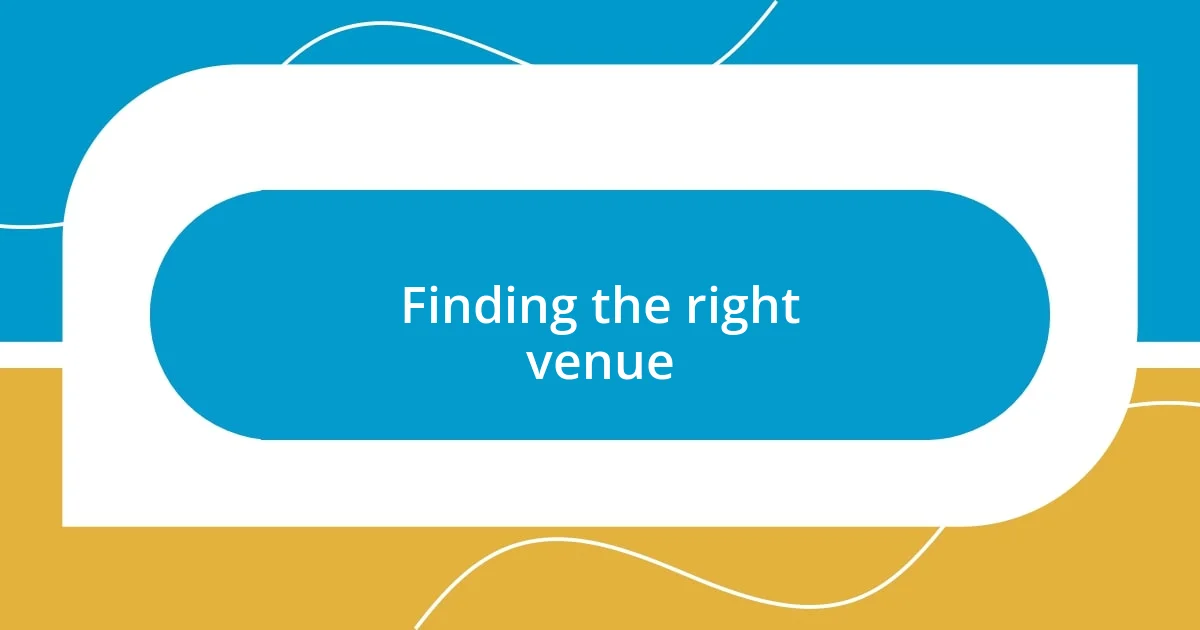
Finding the right venue
Finding the right venue can make or break a live music event. I’ve learned that it’s not just about the physical space; the atmosphere is equally important. I remember scouting a trendy warehouse space that had character oozing from its exposed brick walls and high ceilings. The moment I stepped inside, I could envision the pulsating energy of the crowd and the band performing—those unique architectural features would enhance the entire experience.
When searching for a venue, I consider the location, capacity, and ambiance. The venue should reflect the vibe of the genre and the artists performing. For instance, I once chose a quaint café for an acoustic night. The intimate setting allowed the audience to connect with the performers on a deeper level, making it an unforgettable evening. A space filled with warmth and charm often leads to a stronger emotional response from attendees, which is exactly what I strive to create.
Another essential factor is accessibility. You want to ensure that everyone can join in the fun; this includes considering parking options and public transport routes. I vividly recall an event where we chose a venue that was a hidden gem but difficult to find. Some attendees arrived late, and the vibe was inevitably impacted. That experience taught me the invaluable lesson that even the best venue isn’t perfect if the audience struggles to get there.
| Factor | Considerations |
|---|---|
| Location | Proximity to public transport and parking availability |
| Capacity | Ensuring the venue can comfortably hold your expected audience |
| Ambiance | Does the venue reflect the mood of the music genre? |
| Accessibility | Is it easy for everyone to reach the venue? |
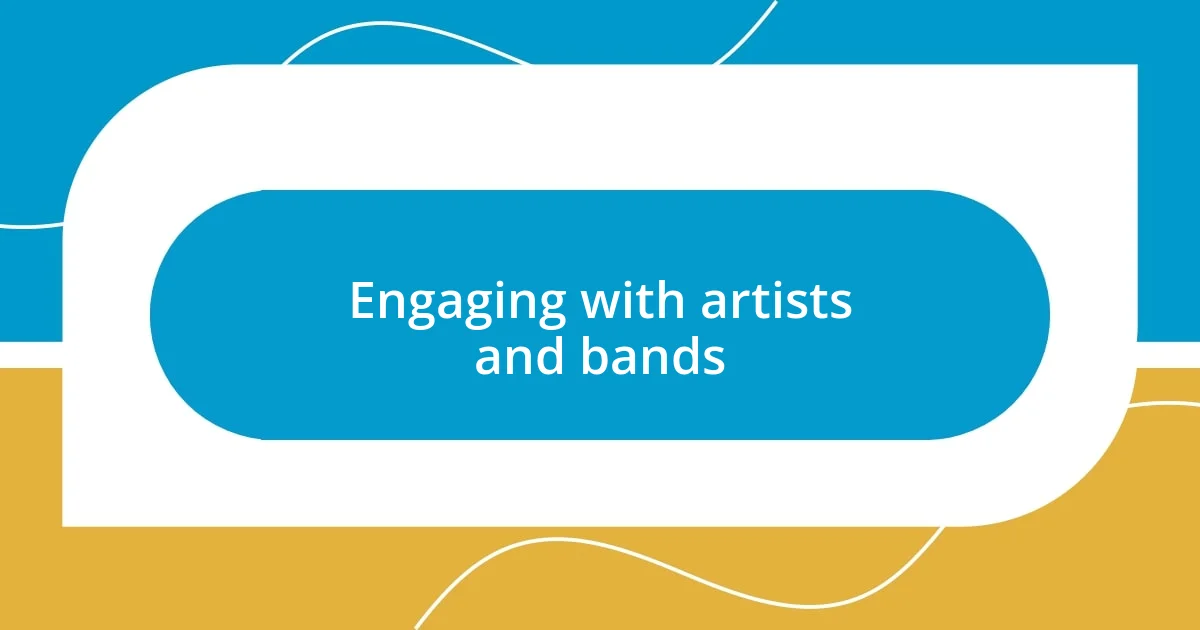
Engaging with artists and bands
Engaging with artists and bands is one of the most exhilarating aspects of planning live music events. I remember my first experience reaching out to a local band; I was nervous, uncertain if they’d even respond. When they did, their enthusiasm was infectious! It was a reminder that artists appreciate when someone believes in their music enough to invite them to perform. Connecting with them isn’t just about logistics; it’s about fostering a genuine relationship that can enhance the entire event.
When I engage with an artist, I make it a point to learn about their story and their music. I once had a conversation with a band where they shared how their songs were deeply rooted in personal experiences. It struck me how a simple question about their inspirations opened a door to a more meaningful connection. By understanding their vision, I’ve been able to create a stage that reflects their artistry. This level of engagement not only brings authenticity to the event but also creates a narrative that resonates with the audience. Don’t you think that knowing the artist’s journey can bring an entirely new perspective to their performance?
As the event date approaches, communication with the artists becomes even more crucial. I’ve learned to set up regular check-ins, whether through video calls or casual chats. It’s all about keeping the excitement alive! One year, I worked closely with a young singer-songwriter who was performing at her first festival. She was nervous, and honestly, so was I! A simple pep talk and some encouragement made a world of difference. Watching her shine on stage, knowing I played a part in building her confidence, was one of the most rewarding experiences of my journey. Engaging thoughtfully with artists can transform not just the event, but also the lives of the individuals involved.
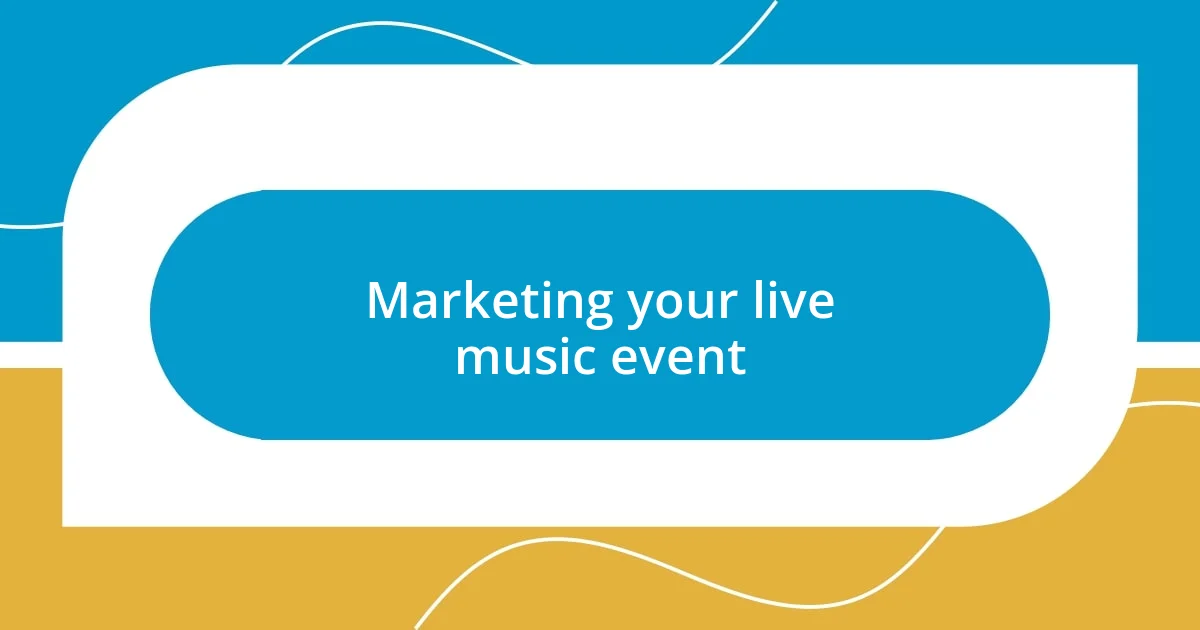
Marketing your live music event
Marketing your live music event is all about capturing attention and creating anticipation. I remember when I first dived into social media marketing for one of my events; I was amazed at how effective a few engaging posts could be. I crafted teasers with snippets of the artists’ music and behind-the-scenes peeks at the planning process. The excitement from potential attendees was palpable, and I realized that sharing the journey not only promoted the event but also built a community around it. Have you ever thought about how much a well-timed post can influence ticket sales?
Email marketing has also been a game changer for me. I started building a mailing list early in my journey, and sending out personalized invites created a sense of exclusivity. I recall a time when a well-crafted newsletter detailing the event’s lineup and special guest appearances boosted our ticket sales significantly. It felt great to see that those who received the email were more engaged and enthusiastic about attending. Isn’t it incredible how a simple email can transform casual interest into active participation?
Another powerful tool I learned to utilize is partnerships with local businesses. Collaborating with cafes, record shops, and even local artists for cross-promotion not only diversifies my reach but also fosters relationships within the community. I remember partnering with a popular local bar that offered drink specials on event nights, which drew in a different crowd and made the event feel even more vibrant. Isn’t it fascinating how collaborations can create a ripple effect, expanding visibility and drawing in more people?
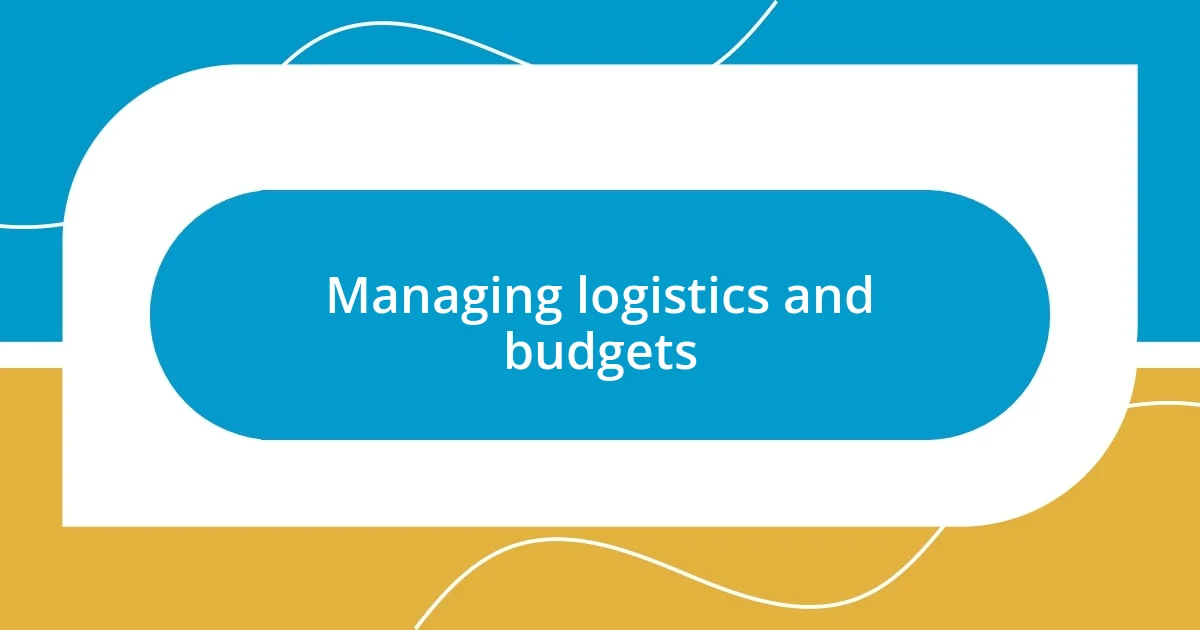
Managing logistics and budgets
Managing logistics and budgets is a balancing act that requires a clear vision and practical strategies. I remember one intense week when I was finalizing the budget for a festival, and I realized how easily costs can spiral out of control if not tracked diligently. Having a detailed spreadsheet became my best friend; it helped me visualize where every dollar was going. Have you ever experienced that rush when you see everything neatly organized, knowing you’re one step closer to pulling off your event?
Then there’s the logistics of coordinating various elements like sound equipment, staging, and vendor contracts. I once underestimated the time it would take to acquire permits and book providers, which led to a last-minute scramble. That taught me a crucial lesson: always start early and build in some buffer time. I now make it a habit to create a timeline with key milestones, allowing for adjustments along the way. Isn’t it refreshing when you can take a deep breath, confident that your plans are on track?
Finally, effective communication plays a pivotal role in managing both logistics and budgets. I’ve found regular check-ins with my team make a world of difference. For instance, during one event, I set up a weekly meeting to ensure everyone was on the same page, which ultimately led to better planning and a smoother execution. It’s amazing how a simple conversation can clear up misunderstandings and keep the whole project moving forward. Have you noticed how much smoother things go when communication flows freely?
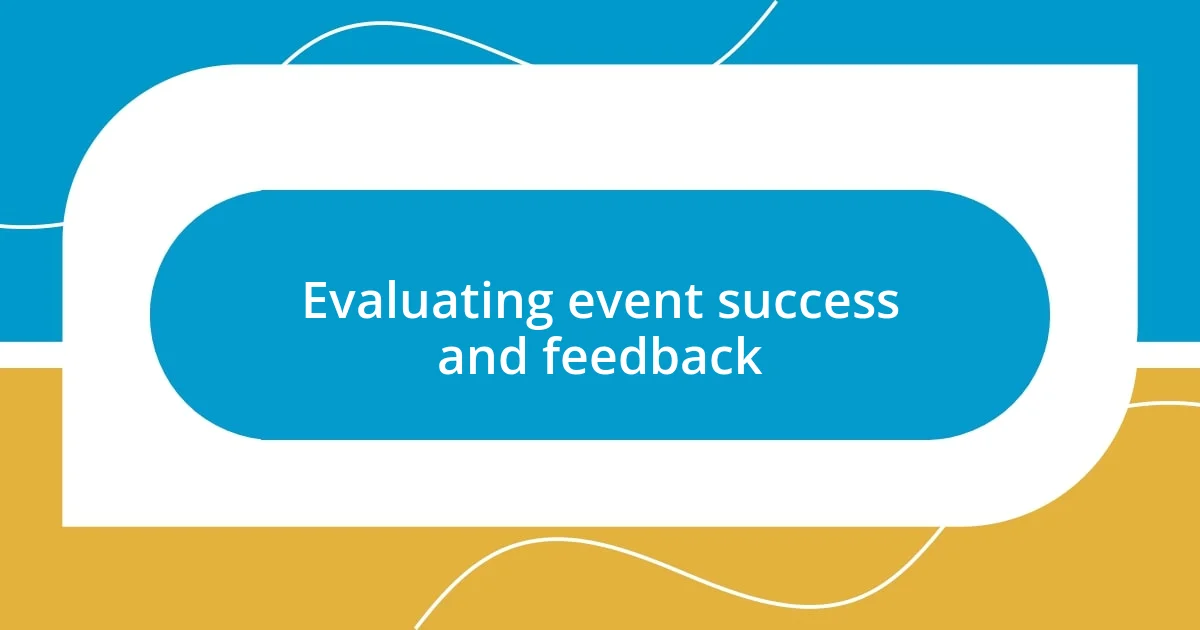
Evaluating event success and feedback
Evaluating the success of a live music event often relies on gathering feedback from attendees, which I’ve found to be invaluable. After one particularly exhilarating concert, I created a quick survey to gauge audience satisfaction, and the results were enlightening. Some attendees left glowing reviews about the energy of the performers while others detailed aspects they felt could be improved. Isn’t it incredible how much you can learn from those who experienced the event firsthand?
In my journey, I’ve realized that informal feedback can be just as impactful as structured surveys. During the post-event wrap-up with my team, I encourage everyone to share their thoughts, and it’s during those discussions that real insights surface. One time, a team member mentioned how long the lines were for drinks, which prompted me to rethink our vendor setup for future events. Have you ever noticed that the smallest details can make or break the overall experience?
Ultimately, success isn’t just about the number of tickets sold; it’s about creating memorable moments that resonate with your audience. I remember feeling a wave of fulfillment when I saw a group of friends smiling and dancing at one of my shows. Their joy reinforced my belief that the emotional impact of an event is a critical measure of success. Isn’t that what it’s all about—connecting with people through music and shared experiences?
